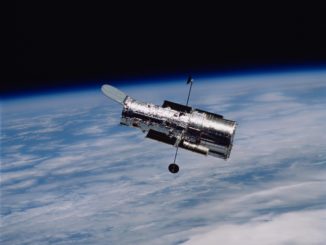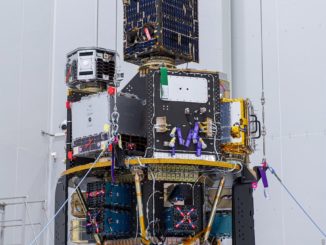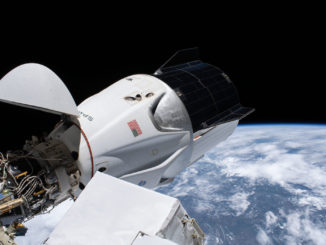EDITOR’S NOTE: Updated at 2:15 p.m. EST (1915 GMT) after end of spacewalk.
STORY WRITTEN FOR CBS NEWS & USED WITH PERMISSION

In a complex bit of orbital surgery, two spacewalking astronauts cut into a $2 billion cosmic ray detector Friday, venting away life-sustaining carbon dioxide refrigerant and then snipping eight coolant lines the size of soda straws to prepare the high-tech “patient” for a coolant pump transplant.
It was the second of four planned spacewalks to repair the Alpha Magnetic Spectrometer, extending its life through the end of the space station program, allowing it to continue its search for clues about the nature of enigmatic dark matter, dark energy and the antimatter thought to have been cooked up in the big bang.
Floating in the Quest airlock compartment, Italian astronaut Luca Parmitano and NASA crewmate Drew Morgan switched their spacesuits to battery power at 7:02 a.m. EST to officially kick off the year’s tenth spacewalk, the 223rd since station assembly began in 1998.
The 7.5-ton AMS, mounted on the right side of the station’s power truss, was not designed to be serviced by spacewalking astronauts, and fixing its failing cooling system is considered the most challenging orbital repair work since shuttle astronauts last serviced the Hubble Space Telescope.
During an initial outing last Friday, Parmitano and Morgan removed a debris shield from the AMS, installed handrails, cut zip ties holding cables and coolant lines in place and pulled back insulation, getting well ahead of schedule and carrying out several tasks originally planned for the second excursion.
Friday’s spacewalk was focused on prepping power and data cables needed by a new coolant pump module; installing a mounting bracket to hold the new pump package in place; cutting a 6-millimeter-wide line to vent carbon dioxide coolant overboard; and cutting eight more small lines that carry CO2 throughout the instrument.
The vent line required two cuts to fully depressurize the AMS’s thermal control system, in the process permanently disabling the instrument as planned until the new pump module and a carbon dioxide reservoir can be attached.
Anchored to the end of the space station’s robot arm, Parmitano, assisted by Morgan, then used custom tools to cut the eight lines used to carry coolant through the AMS, carefully labeling each one to make sure the correct lines are spliced into the replacement coolant pump module during a third spacewalk planned for Dec. 2.
After completing their work Friday, the astronauts made their way back the Quest airlock, ending the six-hour 33-minute excursion at 1:35 p.m.
Assuming no major problems installing the new pump module during their next outing, Parmitano and Morgan will carry out a fourth and final planned spacewalk to close out the overhaul and address any follow-up work that might be needed after the coolant system is re-pressurized and tests are carried out to verify its performance.
The Alpha Magnetic Spectrometer was designed to detect high-energy cosmic rays in long-term research to learn what happened to the antimatter that presumably was created along with normal matter at the birth of the cosmos. It also is looking for clues about the nature of unseen dark matter and the equally mysterious dark energy that is speeding up the expansion of the universe.
Launched to the station in 2011 aboard the next-to-last space shuttle mission, the AMS was designed to operate for three years. But the instrument managed an additional five years before being hobbled by coolant pump failures, and NASA opted to attempt the spacewalk repair job to extend its life.
“It’s not only replacing the pumps, it’s replacing the accumulator, its replacing the heat exchangers, heaters, valves, that whole pump package,” said Ken Bollweg, the AMS project manager at the Johnson Space Center in Houston. “It’s a whole new package that’s designed to extend the life until the end of space station.”



